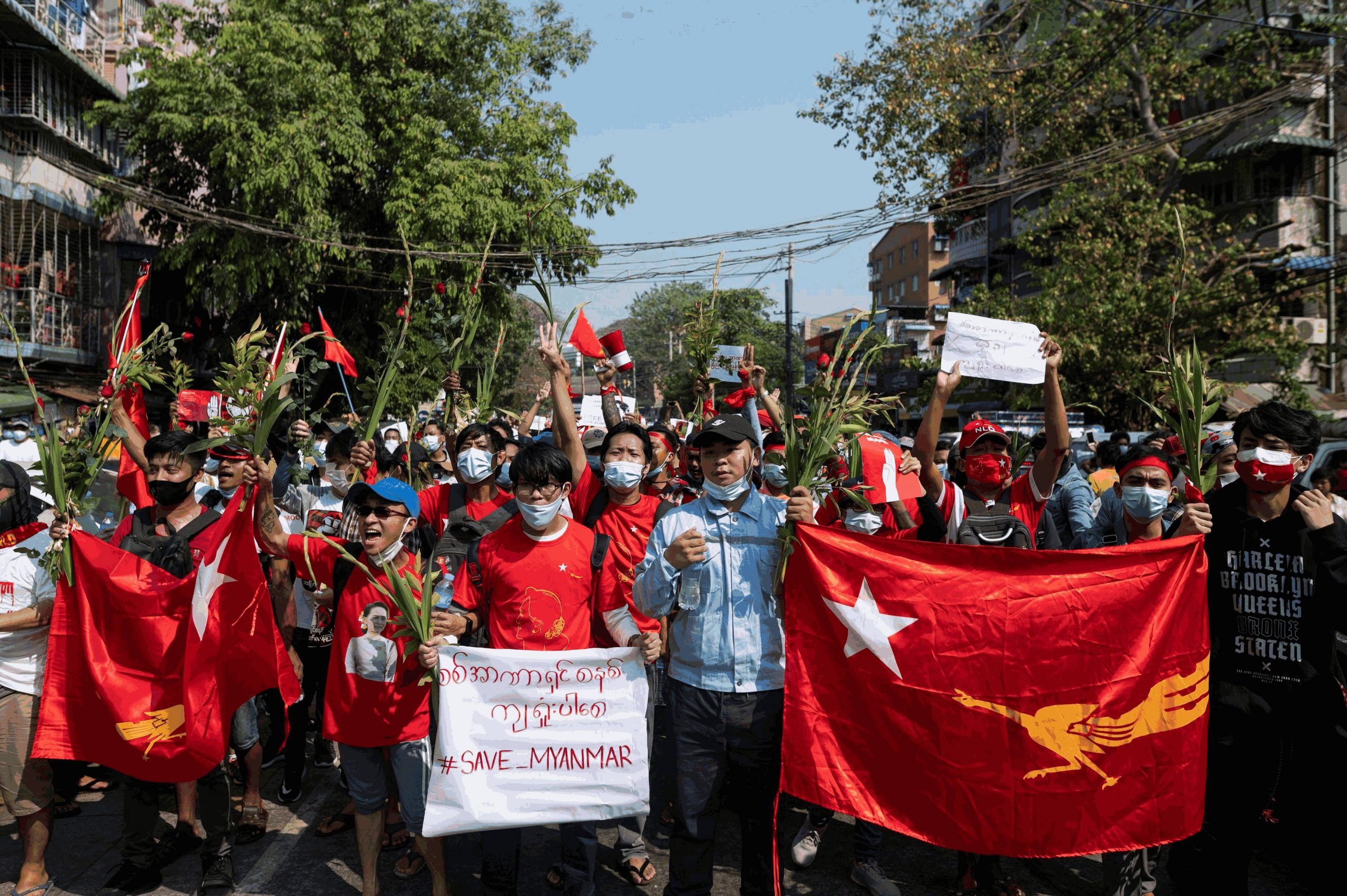Material World
Crackdown or Backdown ?

While there are many unsettling questions posed by Aung Sang Suu Kyi and her National League for Democracy (NLD)’s complicity in the persecution of ethnic minorities, the World Socialist Movement expresses its solidarity with our Myanmar fellow-workers in their present struggle. Having had a taste of liberty, no matter how limited, the people of Myanmar have shown that they will not passively submit to the return of the army dictatorship. The pro-democracy movement has taken on a life of its own in rejecting the rule of an authoritarian military junta. There is now a new generation of young people accustomed to accessing social media. The defiant three-fingered salute of the Hunger Games movies, adopted by pro-democracy activists in Thailand and Hong Kong has now become the gesture of resistance in Myanmar.
‘This movement is leaderless — people are getting on the streets in their own way and at their own will,’ said activist Thinzar Shunlei Yi to AP Press.
Peaceful public demonstrations and spontaneous unofficial strikes have become widespread, actions which are full of personal risk as this army has not hesitated in the past to brutally suppress opposition.
There is much speculation about why the army re-imposed full control but we do know that it was not because of any concern about fraud in the November’s election. The only way to counter the coup is non-violent civil disobedience of one kind or another to win over the state’s forces of coercion, which our fellow workers are now engaged in. This cannot be a fight between the NLD and the generals. It has to be to deprive the junta of legitimacy and recognition and hinder it from functioning by strikes in the hope that this type of mass participation tactic will disable the dictatorship’s ability to rule and disrupt the vast business empire of the Tatmadaw (the armed forces). In addition is the anticipation of possible mass defections from the police and army. Nearly fifty police departments in Loikaw, the capital of eastern Kayah state, crossed lines and joined the protest march where the banner read, ‘No military dictatorship.’ Importantly, without mutinies within the armed forces and police, the ruling clique is likely to win, at least, temporarily.
As the major actor in the Myanmar economy, owning substantial investments, the Tatmadaw has been reluctant to yield meaningful political power. The coup could have been a business decision made in the boardroom rather than the war-room by the upper echelons of the military who feel threatened by Suu Kyi’s continued popularity which could potentially lead to a campaign against corruption and further constitutional change. Suu Kyi and her NLD have tried to re-model the military-dominated economy by implementing the ‘Myanmar Sustainable Economic Development Plan’ which welcomes foreign investment but could bring the hegemony of the military clique to an end.
Who knows what might happen? Information still remains mainly limited to hearsay and guesswork. What we do know is that the NLD collaboration with the Tatmadaw led to garment workers on strike being attacked in 2018 and union activists in May 2020 being arrested. Suu Kyi calculated that Burmese Buddhist nationalism was a winning electoral strategy. Ethnic minorities represent around 40 percent of Myanmar’s total 54 million population. But around 2.5 million ethnic minority citizens were unable to vote in last year’s election – including 1.5 million voters in conflict-affected areas due to security concerns and one million Rohingya who are denied citizenship and voting rights. Political democracy in its current shape has not served Myanmar’s ethnic minorities, but it’s still better, even in an illiberal form, than Tatmadaw rule, a hybrid civil–military system which protects military dominance. The previous political reforms were orchestrated by the country’s military in ways that safeguard its own power interests. This explains the persistence of authoritarian rule and military dominance in contemporary Myanmar politics.
And because the global economic system was interested in profiting from Myanmar’s economic potentials, its largely untapped natural riches – including minerals, natural gas, and hydropower and an undeveloped market – it presented ideal commercial opportunities and so the looming shadows of the generals in the background were conveniently ignored.
Many commentators have excused Aung Sang Suu Kyi’s complicity in the oppression of the Rohingya as a sign that she and her party were never really in charge and that she was obliged to compromise her own democratic ideals in a Faustian pact with the army. If true, the lesson is very clear for all to see now – that those who sup with the devil should have a very long spoon.
Critics of socialism say that what has arisen in Myanmar will happen if there is a socialist victory at the polls — those in control of state power won’t concede their power. Our answer is that if there exists a majority for socialism the socialist movement will eventually prevail one way or another, sooner or later. The immediate reaction would be strikes and demonstrations and mass disaffection, the same disobedience which we witness happening in Myanmar.
ALJO
